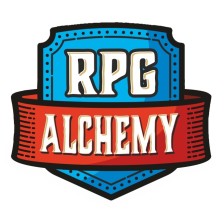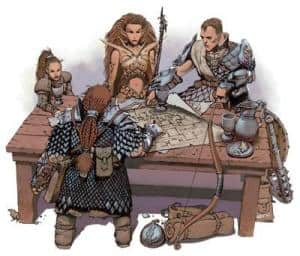First of all, a quick apology to those fans and RPG Alchemy that have wondered where I’ve been. Suffice to say a series of circumstances and events really hindered my article output. Good news though, the light at the end of the tunnel isn’t a train but a return to regular articles! Thanks for staying with us.
Running the con game you say?
Before you start thinking about hustling marks, the con games I’m talking about are gaming convention games, RPG’s in particular. This past weekend I attended one of my favorite conventions, DundraCon in San Ramon, California. This year was the event’s 40th anniversary and I had an excellent time along with a few of the members of my regular gaming group.
Once again I ran some RPGs and this year participated in a few as a player (something I rarely get a chance to do). Watching other GMs run games reminds me of some of the hard lessons I’ve learned over the years attending cons and running games for strangers.
Running a game for a convention is similar to running one at home, however there are a few critically important differences that require a GM to shift their style:
- The game is a one-shot with a specific timeline. The entire story arc, beginning, middle, and end, has to be contained within a clearly define timeframe.
- You can (and need to) streamline your rules and ensure that everything drives the story forward. You don’t want to waste time consulting manuals or debating rules.
- You need to prepare for various levels of player experience as well as the interactions between a group of people that have never played together.
- You have to keep the players focused on the objective. And you have to have an objective!
Looking at these points you may guess that the most important element of running your game is time-management. So with these things��in mind, and a focus on time-management,��I thought I’d share a few tips on running a role-playing game at a convention.
Kick it Off Right
It’s important to set the tone right away. Allow no more than 30 minutes to give a brief (very brief) overview of the rules, let players select pre-gens (always use pre-gens), and set up the open scene. As for the opening scene itself drop the characters right in the middle of things and force them to react (this immediately helps players bond and focus on the game at hand).
- Don’t: have players make characters; it’s a huge waste of valuable time!
- Do: hand out pre-generated characters and give them a clear mission. Also tell each player why their character has already decided to be on this mission!
- Don’t: have players waste time “shopping” for equipment.
- Do: give characters what they need up front and be reasonable about what they possess as the adventure unfolds.
- Don’t: make the players “search” for the adventure.
- Do: drop them right in the middle of the unfolding action. As the GM assume that the characters are already allies, have already received their “briefing”,��and have already started the mission. For all��practical purposes, Act 1 is��basically over; kick off with Act 2.
- Don’t: let them play in a “sandbox”, there isn’t time for that.
- Do: “railroad” them. When I say that I don’t mean force the players into predetermined actions, but do��keep them focused on a predetermined objective.
- Don’t:��get stuck on the specifics of the rules.
- Do: focus on the spirit of the rules over the letter of the rules. Keep things loose and flexible!
- Don’t: ask for as many dice rolls as you’re used to, especially spot or perception checks.
- Do: tell the players��what their characters��see/hear/smell and give them the information. The game isn’t about whether or not they find the clue, it’s about what they do with the clue!
- Don’t: design a 6-hour adventure to fill a 6-hour slot.
- Do: design a 4-hour adventure to fill a 6-hour slot. Trust me, it will expand to fill up the time!
A great con game is all about pacing and keeping the players focused. Force them to react to the adventure and keep the pressure up. Don’t put the players in a position where they have to figure out what’s going on, even if you’re running a mystery. It’s much more interesting to be free with the clues and information and focus on what they do with that information!

